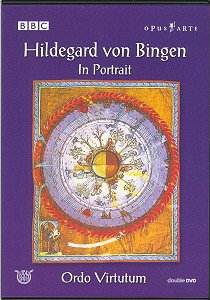Hildegard von Bingen
is one of the rare female composers
from the medieval period whose music
has come down to us. Living in the twelfth
century, a time of renaissance nearly
as exciting culturally as the fourteenth
century, this abbess wrote both texts
and music to praise God. Ordo Virtuum,
the Order of the Virtues, is the oldest
surviving European music-drama, and
Hildegard's greatest musical work.
This DVD is chock full
of material: a performance of Ordo Virtutum,
by Vox Animae, and four documentaries,
recounting the life and music. With
more than four hours of film, this is
a delight for those familiar with Hildegard's
works, and is also a wonderful way to
explore the life and music of this profound
woman.
The singers, dressed
like members of a cult, bear expressions
of mystical ecstasy as they lip-sync
the music among the ruins of what looks
like a church at the beginning of this
film. While it's true that you need
to do much more than simply show a group
like this singing to make it worthwhile
on film, the director has gone to great
lengths to turn this music into a new-age
visual feast. Why bother to show the
singers if they are merely lip-syncing?
The viewer is not witnessing a performance
of the music, but rather a filmic interpretation
of what the music may represent.
This said, the music
is outstanding, and the performers excellent.
The recording is quite good, wherever
it was made. Hildegard's music is perhaps
the most moving of all music of the
period, and this DVD helps you discover
its intensity and depth.
The documentary ĎA
Real Mysticí, unfortunately presented
by a writer of books on new-age spirituality,
talks little about the reality of the
music, but gives his own views of Hildegard,
trying to connect her ideas with those
of the present. Sure, if you're into
this kind of stuff you'll find it interesting,
but the speaker's bias is far too present.
The other two biographical
documentaries, one by the BBC and the
other by the Washington National Cathedral,
are much more conventional, and give
a better understanding of Hildegard's
life and the context in which she composed.
The BBC documentary is one of those
dramatized accounts that suffers from
a cinematic point of view, but which
is nevertheless useful in providing
a good idea of the character of the
subject. While a bit anachronistic -
the castle seen at the beginning, for
example, is not a 12th century structure
- it succeeds in providing enough semblance
of the medieval period to be believable.
The documentary ĎA
Source of Inspirationí, by the Washington
National Cathedral, is a more classic
documentary; with its didactic tone,
and featuring Hildegard's music over
pan-and-scan images, it gives a good
introduction to her life and times.
All in all, despite
the weaknesses of this set, it is truly
entertaining and educational. If you
ignore the fact that the singers are
lip-syncing, you'll enjoy the music,
and you'll certainly learn a lot from
the documentaries.
Kirk McElhearn
